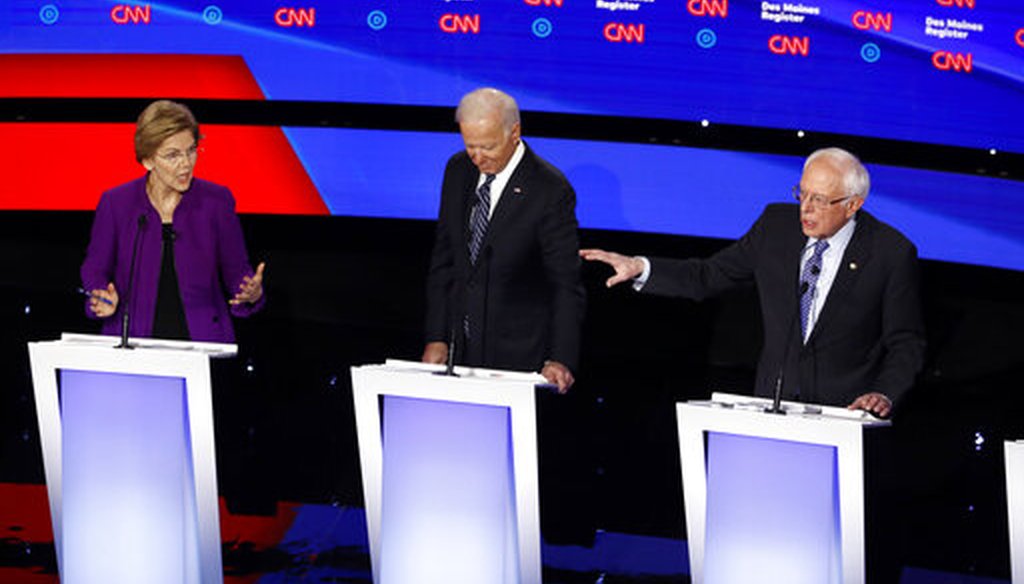

Our only agenda is to publish the truth so you can be an informed participant in democracy.
We need your help.


Democratic presidential candidates Elizabeth Warren, Bernie Sanders, and Joe Biden debate in Des Moines, Iowa, on Jan. 14, 2020. (AP)
Winning is the name of the game in politics. But at one point on the Iowa debate stage, there was also talk of losing — and losing and losing.
It came up during a back-and-forth between Sen. Elizabeth Warren, D-Mass., and Sen. Bernie Sanders, I-Vt., over the question of whether Sanders had once told her that a woman cannot win the presidency.
During the debate, Warren said, "I think the best way to talk about who can win is by looking at people's winning record. So, can a woman beat Donald Trump? Look at the men on this stage. Collectively, they have lost 10 elections. The only people on this stage who have won every single election that they’ve been in are the women, Amy and me." Warren was referring to Sen. Amy Klobuchar, D-Minn.
Readers asked us to track down the math behind this assertion. We found that Warren’s count was correct.
Here’s a rundown of the electoral win-loss records of the six candidates on stage during the CNN-Des Moines Register debate on Jan. 14. The 10 losses are listed in boldface.
2012 Elected to U.S. Senate, defeating Republican incumbent Scott Brown
2018 Re-elected to U.S. Senate.
1998 Elected Hennepin County Attorney
2002 Re-elected Hennepin County Attorney
2006 Elected to U.S. Senate (open seat)
2012 Re-elected to U.S. Senate
2018 Re-elected to U.S. Senate
2010 Lost race for Indiana state treasurer against Republican incumbent Richard Mourdock
2011 Elected mayor of South Bend, Ind.
2015 Re-elected as mayor
1972 Elected to U.S. Senate, defeating Republican incumbent Caleb Boggs
1978 Re-elected to U.S. Senate
1984 Re-elected to U.S. Senate
1988 Ran and lost for president
1990 Re-elected to U.S. Senate
1996 Re-elected to U.S. Senate
2002 Re-elected to U.S. Senate
2008 Ran and lost for president
2008 Re-elected to U.S. Senate
2008 Won the vice presidency
2012 Re-elected to the vice presidency
1972 Lost U.S. Senate special election (running on the Liberty Union party line)
1972 Lost election for Vermont governor (running on the Liberty Union party line)
1974 Lost Senate election (running on the Liberty Union party line)
1976 Lost gubernatorial election (running on the Liberty Union party line)
1981 Elected mayor of Burlington, Vt.
1983 Re-elected Burlington mayor
1985 Re-elected Burlington mayor
1986 Lost election for Vermont governor (running as an independent)
1987 Re-elected Burlington mayor
1988 Lost U.S. House election to incumbent Republican Rep. Peter Smith
1990 Elected to U.S. House, defeating Smith
1992 Re-elected to U.S. House
1994 Re-elected to U.S. House
1996 Re-elected to U.S. House
1998 Re-elected to U.S. House
2000 Re-elected to U.S. House
2002 Re-elected to U.S. House
2004 Re-elected to U.S. House
2006 Elected to U.S. Senate (open seat)
2012 Re-elected to U.S. Senate
2018 Re-elected to U.S. Senate
2016 Ran and lost for president
This is Steyer’s first race for public office.
Meanwhile, after this exchange, Warren and Sanders faced off on another piece of their electoral win-loss records.
Warren said that she was "the only person on this stage who has beaten an incumbent Republican any time in the past 30 years."
The two candidates sparred over the meaning of "at any time in the past 30 years."
As the list above shows, Sanders defeated an incumbent Republican in 1990. That’s right on Warren’s cutoff of 30 years.
Warren said, "Look at the men on this stage. Collectively, they have lost 10 elections. The only people on this stage who have won every single election that they’ve been in are the women, Amy and me."
We checked the electoral histories of the candidates on stage and found that Warren spoke accurately. We rate her statement True.
In a world of wild talk and fake news, help us stand up for the facts.
